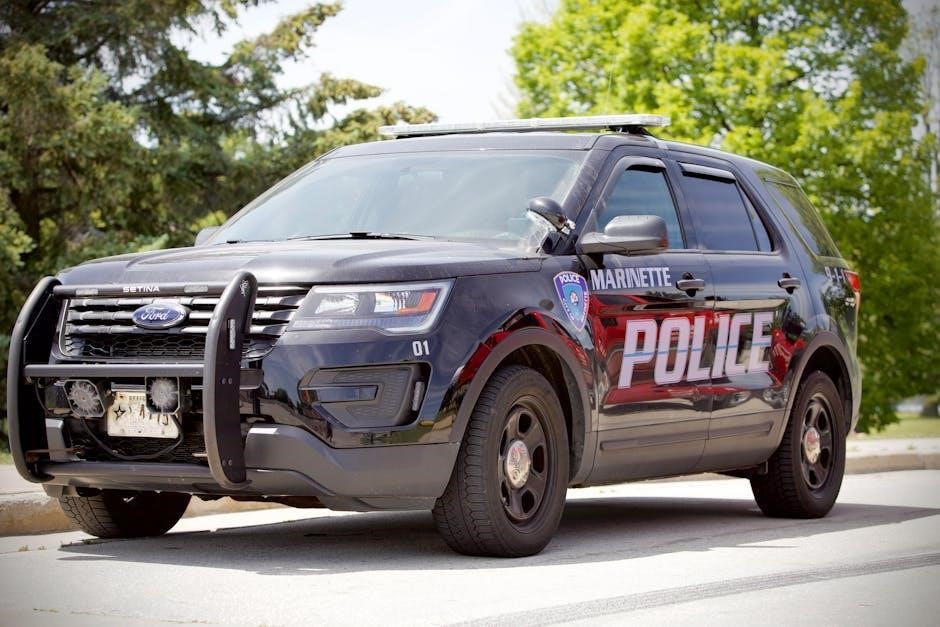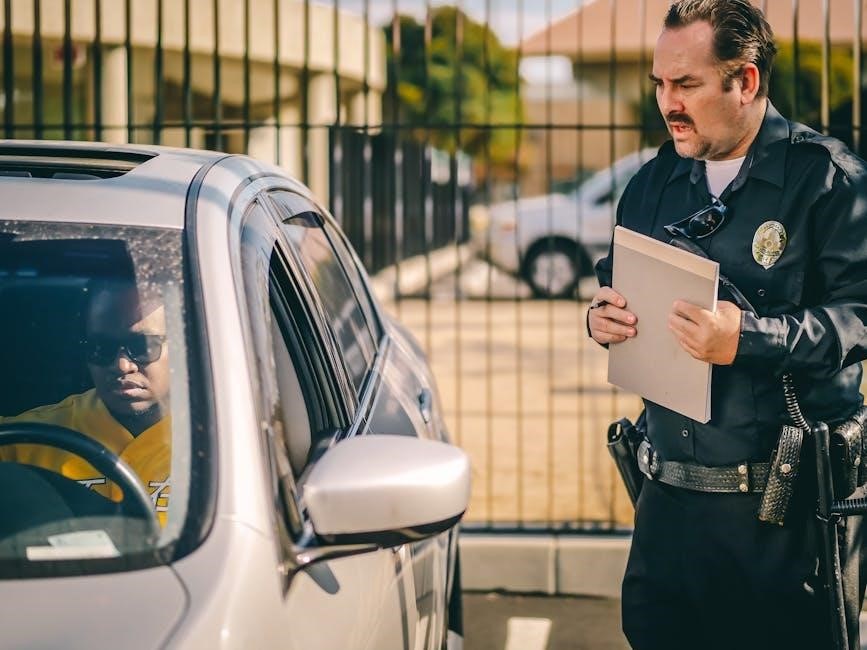The Seattle Police Department Manual outlines policies‚ procedures‚ and ethical guidelines for officers‚ ensuring accountability‚ transparency‚ and community trust while maintaining public safety and legal compliance․
1․1․ Overview
The Seattle Police Department Manual serves as a comprehensive guide outlining policies‚ procedures‚ and ethical standards for officers․ Developed in collaboration with the Renton Police Guild‚ Command Staff‚ and department experts‚ it ensures consistency and accountability․ The manual covers service quality measurement‚ de-escalation techniques‚ and the use of technologies like ALPR for public safety․ It emphasizes transparency‚ community trust‚ and legal compliance‚ while addressing officer conduct‚ including professional device usage and ethical behavior․ The document is structured to promote public safety‚ accountability‚ and community engagement‚ reflecting the department’s commitment to integrity and professionalism․ It provides a framework for officers to perform duties effectively while maintaining public trust and adherence to legal standards․
1․2․ Historical Background
The Seattle Police Department Manual traces its roots to the department’s establishment in 1869‚ evolving to address societal changes and legal standards․ Historically‚ the manual has incorporated lessons from significant events‚ such as the 1993 collaboration with the County Sheriff’s Office‚ which influenced modern policing practices․ Over time‚ the manual has been updated to reflect advancements in technology‚ community engagement‚ and ethical policing․ Key milestones include the 2016 revision‚ which emphasized de-escalation techniques and constitutional policing‚ aligning with national reforms․ This historical evolution ensures the manual remains a comprehensive guide for officers‚ balancing tradition with innovation to maintain public trust and safety․
Organizational Structure
The Seattle Police Department is led by the Command Staff‚ including the Chief of Police and Assistant Chiefs‚ overseeing Patrol Operations‚ Investigations‚ and Special Operations units․
2․1․ Command Staff Roles
The Command Staff of the Seattle Police Department plays a pivotal role in shaping policies and ensuring operational efficiency․ Leaders‚ including the Chief of Police and Deputy Chiefs‚ oversee department-wide initiatives‚ fostering accountability and transparency․ They collaborate with experts and guilds to develop manuals addressing various fields․ Command staff are responsible for implementing ethical standards‚ de-escalation training‚ and community engagement strategies․ Their duties include reviewing use of force incidents and ensuring compliance with legal standards․ By guiding officers and addressing community concerns‚ they strive to build trust and maintain public safety‚ reflecting the department’s commitment to professionalism and integrity in all operations․
2․2․ Department Units
The Seattle Police Department is structured into specialized units‚ each addressing specific community needs․ Units include SWAT for high-risk situations‚ K-9 for narcotics and suspect apprehension‚ and traffic enforcement to ensure road safety․ Additionally‚ there are dedicated units for community policing‚ crisis intervention‚ and technological support․ These units collaborate to maintain public safety‚ with each playing a critical role in the department’s operational success and community trust-building efforts․ Their specialized training and resources enable effective responses to diverse challenges‚ ensuring a comprehensive approach to law enforcement and public service․

Use of Force Policy
The Seattle Police Department’s Use of Force Policy emphasizes Sanctity of Life‚ Proportionality‚ and Duty to Intervene‚ requiring officers to evaluate mental health‚ size‚ and other factors before using force‚ except in active shooter situations․
3․1․ Policy Overview
The Seattle Police Department’s Use of Force Policy is designed to ensure officers use force responsibly and proportionally․ It emphasizes de-escalation techniques and the duty to intervene if excessive force is observed․ The policy aligns with legal standards‚ prioritizing officer and public safety while respecting the sanctity of life․ It outlines clear guidelines for evaluating situations‚ considering factors like mental health and the severity of threats․ All incidents involving force are thoroughly reviewed to ensure compliance with policy and accountability․ This framework aims to balance effective law enforcement with community trust and transparency‚ reflecting SPD’s commitment to ethical policing practices․
3․2․ Types of Force
The Seattle Police Department Manual categorizes force into three types: Type I (low-level force‚ such as verbal commands or physical control)‚ Type II (moderate force‚ like baton or pepper spray use)‚ and Type III (deadly force)․ Each type is subject to thorough review to ensure proportionality and necessity․ Officers are trained to de-escalate situations whenever possible‚ minimizing the use of higher levels of force․ The manual emphasizes that force must align with the severity of the threat and adhere to legal standards‚ reflecting the department’s commitment to public safety and accountability․

Professional Conduct
The manual emphasizes ethical behavior‚ accountability‚ and professionalism․ Officers must adhere to department standards‚ including lawful communication and social media use‚ ensuring transparency and public trust․
4․1․ Ethics and Accountability
The Seattle Police Department Manual emphasizes the importance of ethics and accountability among its officers․ Officers are expected to uphold the highest standards of honesty‚ integrity‚ and professionalism in both their personal and official capacities․ The manual outlines a clear code of conduct‚ requiring officers to obey all laws and departmental regulations; Accountability is enforced through rigorous oversight mechanisms‚ ensuring that officers are held responsible for their actions․ Ethical behavior is non-negotiable‚ and any misconduct is addressed promptly to maintain public trust․ The department also encourages transparency‚ with officers expected to report any unethical behavior they witness․ This commitment to accountability ensures the Seattle Police Department remains a trustworthy and respected institution within the community․
4․2․ Social Media Use
The Seattle Police Department Manual emphasizes the importance of professional social media conduct․ Officers are required to adhere to strict guidelines when using social media‚ ensuring all communications are professional‚ appropriate‚ and lawful․ The manual stipulates that employees must avoid sharing sensitive or confidential information‚ as well as any content that could compromise investigations or damage public trust․ Additionally‚ officers are prohibited from engaging in behavior that reflects poorly on the department or violates ethical standards․ Misuse of social media may result in disciplinary action‚ as outlined in the manual․ The department also encourages transparency and accountability‚ ensuring that social media use aligns with its commitment to community engagement and trust-building․ These policies aim to maintain a professional and respectful online presence․

Community Policing
The Seattle Police Department emphasizes building trust through community engagement‚ measuring service quality via surveys‚ and organizing events like Night Out to foster partnerships and mutual understanding․
5․1․ Service Quality Measurement
The Seattle Police Department measures service quality through various methods‚ including telephone surveys‚ to assess public satisfaction and identify areas for improvement․ Data collected helps evaluate officer performance‚ response times‚ and community interactions․ This approach ensures transparency and accountability‚ fostering trust between the department and the public․ By analyzing feedback‚ SPD can address concerns and enhance services‚ aligning with its commitment to ethical policing and community safety․ Regular reviews of service quality data enable the department to implement changes and maintain high standards of professionalism and effectiveness in serving the community․
5․2․ Community Engagement
The Seattle Police Department emphasizes community engagement to foster trust and collaboration․ Initiatives include organizing events like Night Out‚ Community Clean-Up‚ and Precinct Picnics‚ which strengthen relationships with residents․ The department also measures service quality through telephone surveys to understand community needs and improve responses․ Transparency is key‚ with efforts to maintain open communication and address concerns․ SPD encourages active participation from the public in problem-solving and safety initiatives‚ ensuring a collaborative approach to policing․
- Community events to build trust and rapport․
- Service quality measured through public feedback․
- Transparency initiatives to maintain public trust․

Training and Development
The Seattle Police Department provides comprehensive training programs‚ including de-escalation techniques and ethical standards‚ to ensure officers are equipped to serve the community effectively and professionally․
6․1․ Academy Curriculum
The Seattle Police Department Academy Curriculum is designed to equip recruits with comprehensive skills and knowledge to serve the community effectively․ The program emphasizes crisis intervention‚ de-escalation techniques‚ and ethical conduct‚ aligning with the department’s commitment to public trust and safety․ Recruits undergo rigorous training in legal standards‚ procedural justice‚ and cultural competency to ensure they understand their role in upholding constitutional policing․ Practical scenarios and simulations prepare officers for real-world situations‚ while classroom instruction covers policies‚ community engagement strategies‚ and the use of technology like body cameras․ The curriculum is developed collaboratively with law enforcement experts to reflect best practices and address emerging challenges in policing․ This holistic approach ensures officers are well-prepared to meet the expectations of both the department and the communities they serve․
6․2․ In-Service Training
In-service training for the Seattle Police Department is designed to enhance officers’ skills and knowledge throughout their careers․ This ongoing education ensures officers stay updated on de-escalation techniques‚ crisis intervention‚ and ethical practices․ Training programs often include scenario-based exercises‚ legal updates‚ and community policing strategies to foster public trust․ The department emphasizes continuous improvement‚ with courses tailored to address real-world challenges and evolving community needs․ These sessions also focus on technology use‚ such as ALPR systems and body cameras‚ to maintain professionalism and accountability․ Regular training reinforces the SPD’s commitment to transparency‚ ethical conduct‚ and effective service delivery‚ ensuring officers are equipped to meet modern policing demands while upholding department standards and community expectations․

Crisis Intervention and De-escalation
The Seattle Police Department emphasizes de-escalation techniques‚ mental health assessments‚ and proportional responses to minimize force‚ ensuring officer safety and crisis resolution through trained interventions and strategies․
7․1․ Policy Details
The Seattle Police Department’s crisis intervention and de-escalation policy emphasizes the sanctity of life‚ proportionality‚ and officer safety․ Officers are trained to evaluate suspects’ mental health history‚ size‚ and other factors before engaging․ The policy requires de-escalation techniques in non-life-threatening situations‚ prioritizing communication and time management․ Officers must intervene if colleagues use excessive force․ The policy aligns with PERF’s ICAT model‚ integrating assessment‚ communication‚ and tactics․ Use of force is reviewed under Title 8 of the SPD manual‚ ensuring thorough scrutiny of all incidents․ This approach reflects the department’s commitment to minimizing harm and fostering trust with the community while adhering to legal and ethical standards․
7․2․ Training Programs
The Seattle Police Department emphasizes advanced training programs to enhance officer skills in crisis intervention and de-escalation․ These programs include scenario-based exercises‚ mental health assessments‚ and communication techniques․ Officers participate in Integrated Communications‚ Assessment‚ and Tactics (ICAT) training‚ focusing on proportional responses and de-escalation strategies․ Regular in-service training ensures officers stay updated on best practices and policy changes․ The curriculum is designed to foster empathy‚ critical thinking‚ and community-focused policing․ Training programs also address officer safety‚ cultural competency‚ and ethical decision-making․ By prioritizing continuous learning‚ the department aims to improve public trust and ensure officers are equipped to handle complex situations effectively and professionally․

Internal Affairs and Oversight
The Internal Affairs section outlines procedures for handling complaints and conducting thorough reviews to ensure accountability‚ fairness‚ and transparency within the department․
8․1․ Complaint Procedures
The Seattle Police Department Manual outlines a structured process for submitting and addressing complaints against officers or department practices․ Citizens can file complaints through various methods‚ including online forms‚ in-person submissions‚ or via mail․ The Office of Police Accountability (OPA) oversees the investigation process‚ ensuring impartiality and transparency․ Complaints are categorized based on severity‚ with serious allegations triggering thorough investigations․ Officers and complainants are notified of procedural steps‚ and investigations may involve interviews‚ evidence review‚ and witness statements․ Findings are reviewed by the OPA‚ and recommendations are made to the Chief of Police․ The process emphasizes accountability‚ fairness‚ and public trust‚ with outcomes communicated to all parties involved․
8․2․ Review Process
The review process within the Seattle Police Department involves a thorough examination of incidents‚ ensuring accountability and adherence to policies․ Oversight bodies review complaints‚ use of force incidents‚ and officer conduct to determine if actions align with department standards and legal requirements․ This process includes multiple levels of review‚ from initial assessments to final determinations‚ ensuring transparency and fairness․ Findings are documented and used to identify trends‚ improve training‚ and maintain public trust․ The review process also incorporates feedback from community oversight groups‚ fostering collaboration and accountability․ This systematic approach ensures that all actions are evaluated rigorously‚ promoting a culture of integrity and continuous improvement within the department․

Technology Use
The Seattle Police Department employs technologies like ALPR and body cameras to enhance public safety‚ improve transparency‚ and ensure accountability in law enforcement practices․
9․1․ ALPR Technology
The Seattle Police Department employs Automated License Plate Reader (ALPR) technology to enhance public safety and law enforcement efficiency․ This system captures license plate information to identify stolen vehicles‚ locate suspects in Amber Alerts‚ and assist in criminal investigations․ ALPR data is stored securely‚ with access restricted to authorized personnel‚ ensuring compliance with privacy laws․ The technology is regularly updated to improve accuracy and expand its applications‚ such as real-time alerts for stolen vehicles․ SPD’s use of ALPR balances public safety needs with privacy concerns‚ adhering to strict retention and usage policies․ This tool has proven instrumental in recovering stolen property and solving crimes efficiently while maintaining transparency with the community․
9․2․ Body Cameras
The Seattle Police Department mandates the use of body cameras to enhance transparency‚ accountability‚ and public trust․ Officers are required to activate cameras during interactions with the public‚ including traffic stops‚ arrests‚ and use-of-force incidents․ Recordings are stored securely and retained for a specified period‚ ensuring evidence integrity․ Access to footage is restricted to authorized personnel‚ with provisions for public disclosure under certain circumstances․ The policy emphasizes the importance of maintaining privacy while balancing the need for oversight․ Body cameras have proven instrumental in resolving complaints‚ providing evidence in court‚ and improving officer conduct․ This technology aligns with SPD’s commitment to ethical policing and community trust․ Proper use of body cameras is reinforced through training and adherence to departmental guidelines․

Public Trust and Transparency
The Seattle Police Department prioritizes building trust through transparency‚ accountability‚ and open communication‚ ensuring public confidence and fostering collaborative relationships with the community it serves․
10․1․ Building Trust
Building trust between the Seattle Police Department (SPD) and the community is a cornerstone of effective policing․ The SPD emphasizes transparency‚ accountability‚ and ethical behavior to foster trust․ Officers are trained to engage with the public professionally‚ ensuring actions align with community expectations․ Open communication‚ such as through surveys and public forums‚ helps measure service quality and address concerns․ Trust is earned by consistently demonstrating respect‚ fairness‚ and a commitment to de-escalation techniques․ The department also prioritizes honest dialogue and collaboration‚ recognizing that trust is vital for mutual understanding and cooperation․ By integrating these principles into daily operations‚ the SPD strives to strengthen its relationship with the community it serves․
10․2․ Transparency Initiatives
The Seattle Police Department has implemented various transparency initiatives to foster trust and accountability․ These include the use of body cameras‚ which record interactions between officers and the public‚ ensuring accurate documentation of events․ Additionally‚ the department publishes reports and data on use of force‚ officer conduct‚ and community engagement through public dashboards․ Open data platforms provide citizens with accessible information on police activities‚ fostering greater understanding and oversight․ The SPD also engages in community meetings and forums‚ allowing residents to voice concerns and collaborate on policing strategies․ By prioritizing openness and accessibility‚ the department aims to strengthen its relationship with the community and uphold its commitment to transparency․

Legal Standards and Compliance
The section outlines the legal framework governing SPD operations‚ ensuring constitutional policing‚ compliance with state and federal laws‚ and adherence to legal standards in all enforcement activities․
11․1․ Constitutional Policing
The Seattle Police Department is committed to upholding constitutional policing principles‚ ensuring officers respect and protect individuals’ rights under the Fourth and First Amendments․ Training emphasizes understanding and applying legal standards to avoid unlawful searches‚ seizures‚ or speech restrictions․ Officers are educated on constitutional implications of their actions‚ ensuring transparency and accountability in all interactions․ The department prioritizes de-escalation techniques to minimize force and respect citizens’ rights‚ fostering trust and legitimacy within the community․ Regular audits and oversight mechanisms are in place to ensure compliance with constitutional standards‚ promoting a culture of lawful and ethical policing․ By adhering to these principles‚ SPD strives to maintain public safety while safeguarding civil liberties‚ reflecting its dedication to justice and equality․
11․2․ State Laws
The Seattle Police Department adheres to all applicable state laws‚ ensuring compliance with Washington State legal codes․ These laws guide officer conduct‚ use of force‚ and procedural standards․ The manual incorporates state-specific regulations‚ such as those related to de-escalation and crisis intervention‚ aligning with legal and ethical expectations․ Officers are trained to uphold these laws‚ reflecting the department’s commitment to accountability and transparency․ Regular reviews ensure adherence to state mandates‚ fostering trust and legitimacy within the community․
